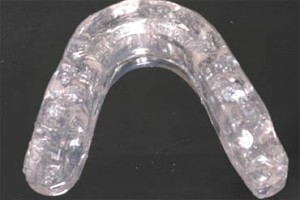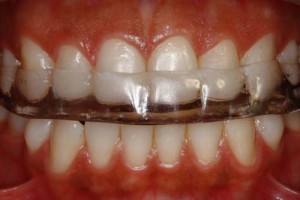¿What about Bruxism?
Bruxism is the habit of clenching or grinding your teeth involuntarily. It usually happens during sleep, due to an increased activity of the elevating muscles of the jaw. This generates wear of the teeth and it can cause facial muscular pain. The main trigger tends to be psychological, stress being one of the most important factors.
The cause of bruxism is subconscious, acting indirectly on some people and therefore causing this disorder. As opposed to other pathologies, like cavities or gum disease where prevention is key, bruxism is an involuntary habit and most patients do not even know they have it until they feel muscle pain or the teeth wear becomes evident. Therefore, it is important that the dentist identifies this condition at its early stages. They will explain the need for a relaxing mouth guard or night guard that will stabilise the stomatognathic system and prevent further complications: if the teeth grinding becomes pathological, it may even compromise the temporomandibular joint (TMJ).
What is a relaxing dental guard?
This is a splint made from hard resin. It is U shaped and adapted to the patient’s teeth. They are custom made and fitted to each patient following specific clinical criteria. In making it, the use of a semi adjustable articulator is key, and contacts have to be bilateral and pointy, so that perfect neuromuscular relaxation and pacification can be achieved. All this translates in comfort when being used by the patient.
This relaxing dental guard can be made for the superior or inferior jaw, depending on each case and patient.
.
As we have stated, there are no specific causes that may explain this disorder, but we know that stress and anxiety are factors that sometimes trigger teeth grinding or gnashing during the patient’s sleep. Probable causes may be:
- Abnormal contacts between opposed teeth
- Dental interference
- Stress
- Anxiety
- Personality traits
- The type of dentition
- Body position and head position during sleep
Common symptoms Pain is the symptom that usually moves people to visit de dentist. Pain can be muscular, or it can be dental, and cause generalised tenderness.It can also be acute, sometimes affecting the TMJ and even moving on to affect the neck and face. Teeth grinding also leads to wearing of the teeth surfaces and in extreme cases even to tooth fracturing.
Some symptoms are key to identifying if we have bruxism.
- Dental:
- Tooth wear on the occlusive face
- Tooth mobility
- Dental fractures
- Grinding or clenching noise
- Inflammation of the dental pulp
- Neuromuscular:
- Facial muscle fatigue
- Neck and face muscular pain
- Soft tissue:
- Hypertrophy of jaw muscles
- Articular:
- Joint pain
- Noise when moving the joints


